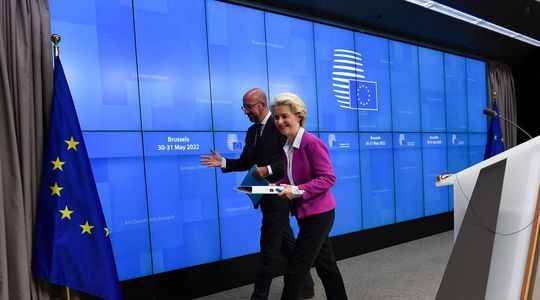This time Volodymyr Zelensky was heard. In the preamble to the European Council on Monday May 30, the Ukrainian President addressed the Twenty-Seven European Heads of State in a calm, almost appeased tone. “It’s time to stop your divisions, your internal quarrels, to show your unity,” urged the hero of kyiv.
A few hours later, a handful of seconds before midnight, the European Union agreed – finally! – to ban 90% of its imports of Russian oil. “This is a turning point: Europeans choose to hurt themselves to hurt Russia, underlines Cyrille Bret, associate researcher at the Jacques Delors Institute. Previously, sanctions were imposed on Russia to make it change of course. There, we inflict this sanction on Russia to cut the bridges with her.”
Negotiations around Moscow’s black gold will have lasted almost a month. The EU will end by 2023 its purchases by sea, i.e. two thirds of its imports. In addition, Germany and Poland have decided to no longer consume Russian oil, which increases the European embargo to 90%. “This is an important decision, an additional level in the pressure put by the EU on Russia, believes Ricardo Borges de Castro, deputy director of the European Policy Center. This package of sanctions has major consequences, very concrete, on the European economy, which explains why it was so difficult to concretise.”
Major improvements have been granted to Hungary, Slovakia and the Czech Republic, which can continue to supply themselves via the Russian pipeline from Druzhba, at least until 2024. Triumphant, Viktor Orban paraded on social networks at 1 a.m., boasting of having “defeated the European Commission” and its “perverse idea” of banning Russian oil from Hungary.
“Are they going to turn off the gas?”
In Brussels, the question now arises of the sequence of events. The Baltic countries and some Eastern European states are already calling for a seventh package of sanctions against Russia, in order to keep the pressure on the Kremlin. But these last weeks, trying for European unity, could mark a rupture in the effort of sanctions of the EU. “The sanctions are extremely important, they have gone far beyond the symbolic stage and are beginning to seriously damage the economic health of Europe, warns Cyrille Bret. We must take a break, let the sanctions produce their effects. Ukraine needs of a Europe in good health, including economically.”
On the other hand, the Twenty-Seven have no intention of slowing down their massive support for Ukraine on the military and financial levels. But all eyes are now on Moscow, and its potential reprisals against the EU after this oil embargo. “Are they going to cut off the gas? Asks Ricardo Borges de Castro. We have to be careful, because many European countries simply do not have the infrastructure to do without Russian energy, and you cannot change your infrastructure overnight. We are in a marathon, and these European decisions will not have an immediate impact on the course of the war in Ukraine.”
Tuesday morning, the price of oil rose again after the announcement of the European embargo. For now, European consumers are toasting, and Russian finances continue to spin.
